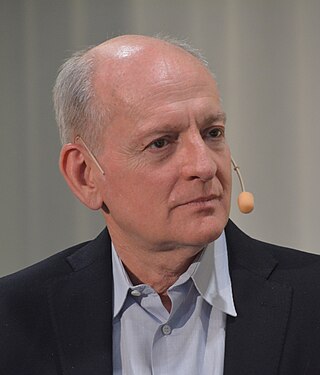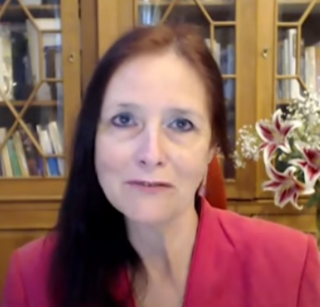
Anglia Ruskin University (ARU) is a public university in East Anglia, United Kingdom. Its origins are in the Cambridge School of Art (CSA), founded by William John Beamont, a Fellow of Trinity College at University of Cambridge, in 1858. It became a university in 1992, and was renamed after John Ruskin, the Oxford University professor and author, in 2005. Ruskin gave the inauguration speech of the Cambridge School of Art in 1858. It is one of the "post-1992 universities". The motto of the university is in Latin Excellentia per societatem, in English Excellence through partnership. Anglia Ruskin University was named University of the Year 2023 by Times Higher Education.

Nick Bostrom is a philosopher known for his work on existential risk, the anthropic principle, human enhancement ethics, whole brain emulation, superintelligence risks, and the reversal test. He was the founding director of the now dissolved Future of Humanity Institute at the University of Oxford and is now Principal Researcher at the Macrostrategy Research Initiative.
Intelligence has been defined in many ways: the capacity for abstraction, logic, understanding, self-awareness, learning, emotional knowledge, reasoning, planning, creativity, critical thinking, and problem-solving. It can be described as the ability to perceive or infer information; and to retain it as knowledge to be applied to adaptive behaviors within an environment or context.

Stuart Jonathan Russell is a British computer scientist known for his contributions to artificial intelligence (AI). He is a professor of computer science at the University of California, Berkeley and was from 2008 to 2011 an adjunct professor of neurological surgery at the University of California, San Francisco. He holds the Smith-Zadeh Chair in Engineering at University of California, Berkeley. He founded and leads the Center for Human-Compatible Artificial Intelligence (CHAI) at UC Berkeley. Russell is the co-author with Peter Norvig of the authoritative textbook of the field of AI: Artificial Intelligence: A Modern Approach used in more than 1,500 universities in 135 countries.

Margaret Ann Boden is a Research Professor of Cognitive Science in the Department of Informatics at the University of Sussex, where her work embraces the fields of artificial intelligence, psychology, philosophy, and cognitive and computer science.

Indian Institute of Technology Madras is a public technical university located in Chennai, Tamil Nadu, India. It is one of the eight public Institutes of Eminence of India. As one of the Indian Institutes of Technology (IITs), IIT Madras is also recognized as an Institute of National Importance.

The Future of Humanity Institute (FHI) was an interdisciplinary research centre at the University of Oxford investigating big-picture questions about humanity and its prospects. It was founded in 2005 as part of the Faculty of Philosophy and the Oxford Martin School. Its director was philosopher Nick Bostrom, and its research staff included futurist Anders Sandberg and Giving What We Can founder Toby Ord.

The Centre for Research in the Arts, Social Sciences and Humanities (CRASSH) is an interdisciplinary research centre within the University of Cambridge. Founded in 2001, CRASSH came into being as a way to create interdisciplinary dialogue across the University’s many faculties and departments in the arts, social sciences, and humanities, as well as to build bridges with scientific subjects. It has now grown into one of the largest humanities institutes in the world and is a major presence in academic life in the UK. It serves at once to draw together disciplinary perspectives in Cambridge and to disseminate new ideas to audiences across Europe and beyond.
The ethics of artificial intelligence is the branch of the ethics of technology specific to artificial intelligence (AI) systems.
The Coral Bell School of Asia Pacific Affairs is a constituent of the College of Asia and the Pacific at the Australian National University. The study of the Pacific was formerly a research focus of the Research School of Pacific Studies, founded in 1946 at the Australian National University. Following a University restructure in 2009, the Research School was amalgamated with the Faculty of Asian Studies and renamed the College of Asia and the Pacific (CAP). The disciplines and units of the College were distributed among four Schools:
Machine ethics is a part of the ethics of artificial intelligence concerned with adding or ensuring moral behaviors of man-made machines that use artificial intelligence, otherwise known as artificial intelligent agents. Machine ethics differs from other ethical fields related to engineering and technology. It should not be confused with computer ethics, which focuses on human use of computers. It should also be distinguished from the philosophy of technology, which concerns itself with technology's grander social effects.
Jonnie Penn is a bestselling Canadian non-fiction author and artificial intelligence researcher.
The Centre for the Study of Existential Risk (CSER) is a research centre at the University of Cambridge, intended to study possible extinction-level threats posed by present or future technology. The co-founders of the centre are Huw Price, Martin Rees and Jaan Tallinn.
Huw Price is an Australian philosopher, formerly the Bertrand Russell Professor in the Faculty of Philosophy, Cambridge, and a Fellow of Trinity College, Cambridge.

The Future of Life Institute (FLI) is a nonprofit organization which aims to steer transformative technology towards benefiting life and away from large-scale risks, with a focus on existential risk from advanced artificial intelligence (AI). FLI's work includes grantmaking, educational outreach, and advocacy within the United Nations, United States government, and European Union institutions.

The Department of Politics and International Studies at the University of Cambridge is the department at the University of Cambridge responsible for research and instruction in political science, international relations and public policy. It is part of the Faculty of Human, Social, and Political Science.
Murray Patrick Shanahan is a professor of Cognitive Robotics at Imperial College London, in the Department of Computing, and a senior scientist at DeepMind. He researches artificial intelligence, robotics, and cognitive science.
Beth Victoria Lois Singler, born Beth Victoria White, is a British anthropologist specialising in artificial intelligence. She is known for her digital ethnographic research on the impact of apocalyptic stories on the conception of AI and robots, her comments on the societal implications of AI, as well as her public engagement work. The latter includes a series of four documentaries on whether robots could feel pain, human-robot companionship, AI ethics, and AI consciousness. She is currently the Junior Research Fellow in Artificial Intelligence at Homerton College, University of Cambridge.

Kanta Dihal is a Dutch research scientist who works at the intersection of artificial intelligence, science communication, literature, and ethics. She is currently a lecturer in science communication at Imperial College London. Dihal is co-editor of the books AI Narratives: A History of Imaginative Thinking About Intelligent Machines and Imagining AI: How the World Sees Intelligent Machines.

Kay Firth-Butterfield is a lawyer, professor, and author specializing in the intersection of artificial intelligence, international relations, Business and AI ethics. She is the CEO of the Centre for Trustworthy Technology which is a Member of the World Economic Forum's Forth Industrial Revolution Network. Before starting her new position Kay was the head of AI and machine learning at the World Economic Forum. She was an adjunct professor of law at the University of Texas at Austin.









